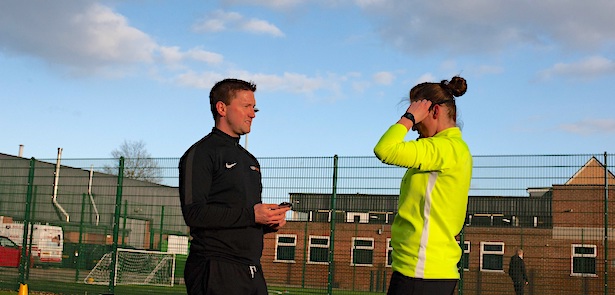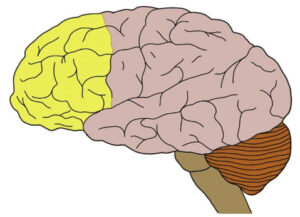“The mind and the body…it’s all connected”

We asked Lee Waters – Performance Psychologist, UCP Lecturer and motivator of pro sportspeople, including POSH players – what his tips were be for dealing with lockdown. If you’re looking for motivation – even inspiration – read on…
I once heard a man say: “There’s no shame in being afraid, being honest we’re all afraid. What you should do is figure out what you’re afraid of because when you put a face on it, you know what you’re fighting and you can beat it. Better yet, you can use it”.
Considering the present circumstances, I believe these to be extremely poignant words. 16 March 2020 is a day that will live in infamy for many people in the United Kingdom, as that was the day Boris Johnson made the address to the nation to say “now is the time for everyone to stop non-essential contact”. We will always remember where we watched it and who we watched it with. It was an announcement that confirmed people’s thought processes and fears leading up to it; that there will be very uncertain times ahead. They were uncertain as up until that point very few people knew exactly what a lockdown actually meant and what ramifications it would have. How will I be able to do my job? How will I still see my friends? Can I still shop? Can I still go to the gym? These were some of the many questions going through people’s heads.
This uncertainty created a high level of anxiety in a large portion of the population and that was predominantly down to a fear of the future. Or more specifically, a fear of not having a clear idea of what the future would look like. This anxiety came in two forms, psychologically (cognitive) through a variety of thought processes, and physiologically (somatic) through raised blood pressure, sweating etc. Anxiety can have significant negative effects on us as human beings and it will have worked its way into multiple areas of people’s lives such as sleep, ability to have calm conversations or the ability to perform simple coordinated movements. It will have even effected people on occasion without them even knowing it as it uses up vital energy that the body requires to function. As a result, some individuals may have started to become fatigued or tired more regularly than usual, causing them to feel uncharacteristically ‘sluggish’ both cognitively (psychologically) and somatically (physically)

Figure 1: The Stress Response
Anxiety was not the only emotion that has been experienced, as stress has also come very much to the fore. Typically, stress occurs when people look at a situation and feel they do not possess the skills to cope or succeed in it. Figure 1 highlights the stress response that everyone goes through in a variety of situations, whether that be when you are required to do a presentation or faced with a pandemic. In this case the human race was faced with a situation (stimulus) it had never faced before, so it’s perfectly understandable for people to be unsure if they had the skills to cope. If people started having stress responses, as with anxiety, it had some significant implications on individuals, most notably affecting their ability to make decisions.

Figure 2: The Pre-Frontal Lobe
Figure 2 shows the area of our brain (highlighted in yellow) where decisions are made, and I am sure you will notice it is rather small considering the importance of its job. Unfortunately, when we become stressed this part of the brain becomes even smaller as it physically shrinks and loses some of its capacity to work effectively. It would be like you easily bicep curling 20kg, but then having half of your bicep muscle taken away to do the same action. We have all been in situations where we just freeze, cannot think clearly or make decision and this is typically the reason for that.
So why have I just gone through this this with you? There are two main reasons. Firstly, it is to highlight processes that every single one of us experience and to let people know it is a perfectly natural thing to happen. In my experience as an athlete, lecturer, and performance psychologist these are the two biggest emotions, along with fear, that are required to be managed as they have significant implications on others. For example, if you can’t manage your stress levels and make effective decisions, that means you will not be effective in what you are trying to achieve. If you are not effective it will most likely lead to you failing which in turn will have a detrimental effect on your confidence; here begins a downward spiral. I always introduce the topic of psychology to students and athletes by discussing the concept of what is the physiological difference between fear and excitement. 99% of the time they initially insist there are clear and distinctive differences, but just can’t articulate them. As the discussion continues however, it becomes clear that physiologically there are minimal differences, but psychologically the difference can be profoundly debilitating. Secondly, it is also to highlight the fact I use the word ‘manage’. It is virtually impossible to completely irradicate fear, anxiety and stress as we are humans and not robots. But there are actions that can be taken to manage and replace these emotions so they do not have as much of a detrimental effect on our lives. So, here are some cheap and easy recommendations to assist people in this latest situation we find ourselves in.
SOCIAL MEDIA & TECHNOLOGY BREAKS…Social media has been both a saviour and a curse. I see all these people showcasing how productive they are being with research, home projects and exercise gains and congratulations to those individuals who have been able to dedicate time and effort to those goals and be successful. However, this should not place pressure on everyone to think “I must be productive and have something to show for this lockdown” as this can have significant detrimental effects. This whole concept of being productive during this time is an interesting one and was something that J.K. Rowling discussed at length during Lockdown 1. She argued that it was OK for people not to be productive and condemned life coaches for essentially pressuring people to be so. I have to say I agree with her to a point that people do not “need to” produce something tangible by the end of this, which is what so many are suggesting we should throughout social media. So, with this in mind, take social media breaks and in addition to that, complete technology breaks. It’s far too easy to spend hours going through a variety of posts as we are facing less structured days. A dissertation student of mine did some research into the effects of social media and she found that those who spend more than 2 hours on it start to be significantly affected.
REFLECT…I believe these times are a perfect opportunity for us all to reflect, re-evaluate and reset our lives in some way. H.G. Wells put it best when he wrote “Sometimes, you have to step outside of the person you’ve been and remember the person you were meant to be. The person you want to be. The person you are.” The art of reflection is a powerful tool and if you wish to have more information on this a local expert and author of #Life, Jym Brown is the person to go to.
PHYSICAL ACTIVITY & EXERCISE…Yes, they are different things. Physical activity is general day-to-day actions that require energy expenditure such as cutting the grass or hoovering, whereas exercise is something that is purposeful with the goal of improving one’s fitness. My point is that both can help as they both allow for energy expenditure and stimulate the natural release of endorphins which has a similar effect to taking opioid drugs.
EXERCISE…it does not have to be elaborate and come in the form of all these challenges that are being set such as ‘Run Every Day (RED)’. They can be a simple pyramid circuit consisting of five basic exercises (e.g. Press Ups, Sit Ups, Lunges, Back Raises and Squats) that assist your everyday life. The pyramid approach requires you to do a set amount of repetitions (reps) of each exercise to ‘up’ the pyramid and then ‘down’. For example (2,4,6,8,10,12,10,8,6,4,2) complete two reps of every exercise before moving up to 4, then 6 and so on. Time your effort and aim to match or better that the next time. As you progress you can increase the reps.
THE GREAT OUTDOORS…Go outside (within government guidelines) and enjoy nature on walks and runs, whichever you prefer and enjoy, it does not need to be intense.
EMBRACE THE OPPORTUNITIES THIS PRESENTS…For me in my profession I have been forced to do things very differently in terms of delivery, as most of it is now virtual. This is completely different to face to face teaching or coaching and is something I was never trained to do. But the situation has presented the opportunity to learn a new method and something that students and players have been positive about.
STRUCTURE & ROUTINE…Try and have some form of structure/routine to your day, as many people have suggested the worst thing about this situation for them is that they don’t know what they are doing from morning to the afternoon. We have gone from such a structured way of life where there were boundaries (physical and psychological) between work and personal lives. Although that structure provided other kinds of issues, the boundaries have become somewhat blurred with working from home.
I have not written this to preach that I have found the perfect ways for all people to get through these troubling times, I am not arrogant enough to make such a claim. I have written this to provide an insight into some methods that have been useful for me to keep functioning as both a human being, a professional and not be debilitated by fear, anxiety and stress. Each one of you will have your own way (even if it’s not obvious right now) to deal with these situations but in the words of Tennyson its human nature “to strive, to seek and not to yield”. We have never been in a better position to beat something like this. If you look at the evidence of the past and place it in perspective, it tells me we will and be better for it as a human race moving forward.
Lee Waters BSc (Hons) MSc, SFHEA, PhD Candidate















